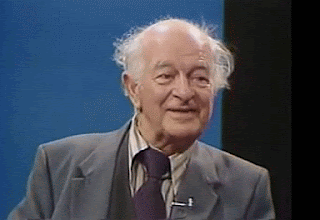My father was the parent who was patient about answering questions then suggesting how to learn more when questioning became tedious, or when we reached an impasse due to the limits of his knowledge or the limit of his interest in the topic. But the most meaningful conversation my mother ever had with me was about Linus Pauling and Vitamin C, in 1954 shortly before I started first grade. At that time Pauling had recently been awarded the Nobel prize in Chemistry. The occasion of this conversation centered on Mom having started to give me an ascorbic acid tablet every morning. They were so sour! I couldn't swallow them so she convinced me to chew up the tablet because she said it would prevent me from getting sick - that Linus Pauling's research for which he had earned a Nobel Prize, proved it.
For some reason this really rang true with me - perhaps because I had just recovered from a cold and didn't want another anytime soon. But, also, Mother had spoken to my intellect! So from that time forward I enjoyed chewing up my very sour ascorbic acid tablet each morning. Mother had succeeded in getting me to do that without corporal punishment because she had connected Linus Pauling's research "about atoms of vitamin C" and how they would keep me healthy, with my recent "discovery" of atoms while listening to a radio program about the discovery of Atoms! Atoms. Wow! The radio program said in ancient Greece atoms were said to be the building blocks of everything, then went on to tell the history of their discovery and structure and composition (at that time). It was the first time I recall being truly fascinated and energized, at home, about learning. Only the epiphany of learning to read at school would soon compare.
I have consistently taken extra vitamin C daily since the day I learned of Linus Pauling. It would be accurate to say that Linus Pauling was a childhood hero of mine because, to my mind, the work he did as a scientist kept me healthy. But I really did not know much more about him until 25 years later when an amazing opportunity presented itself to attend his autobiographical lectures, a series of four free lectures open to the public that Linus Pauling presented at a local university in the early 80s. Clearly his research had actually made him a hero in the field of science - a highly intelligent hero with a humble demeanor. It was so refreshing to listen to him tell the story of his life's work. He emphasized how all of his scientific work led back to his original research into the crystal structure of vitamin C! As far as heroes, childhood and beyond, I realized at that time that I had chosen well.
- Beyond Vitamin C: Linus Pauling's Legacy and Current Research
The first part of the video is fascinating biographical information. The second presenter goes into detail about some current orthomolecular research. (It becomes a bit tedious when he is talking about research with rats.) Approximately an hour.
"The potential health benefits of vitamin C may be Linus Pauling's most famous legacy among the public, but the Oregon State University graduate and two-time Nobel Prize winner is better known among scientists for deep insights into chemistry and its application to medicine. The May 13, 2013 Corvallis Science Pub lecture focused on little-known highlights of Pauling's life and on how scientists are applying his findings today."
- Conversations with History: Linus Pauling
"In this 1983 interview, Nobel Laureate Linus Pauling joins U.C. Berkeley's Harry Kreisler for a discussion of the role of scientists in the peace movement."
This particular conversation is a discussion of the role of scientists in the peace movement. It occurred near the time I attended his lectures in the 80s. It is interesting to listen to Pauling thoughtfully speaking of his experiences and offering his opinions. The video provides a lot of good insight into "the cold war" dynamic for those who didn't experience being born into and growing up during the Cold War era. It would have been so wonderful to have had classes taught by Linus Pauling. Listening to and learning from Linus Pauling in the lectures I am grateful to have been able to attend was easy and uplifting - a real joy. - Linus Pauling Online Oregon State University Special Collections & Archives Research Center
